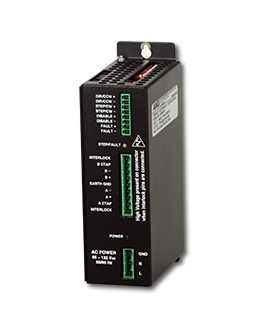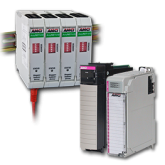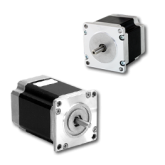SD17060B Stepper Motor Driver
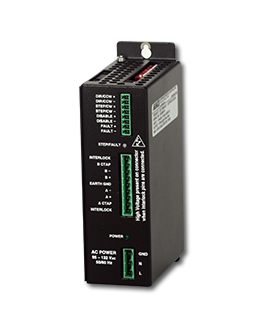
-Frees up panel space but mounts like the standard SD17060.
-Requires less cooling area and offers multiple mounting options for increased thermal transfer.
Description
Microstepping Stepper Motor Driver - 6.3 Arms/8.9A peak (114VAC)
The SD17060B is a compact and powerful 6.3 Arms stepper motor driver that boasts several enhancements over its previous iteration (SD17060).
A narrower, more compact design retains the standard mounting pattern, but saves valuable panel space. Additionally, improvements to the drive yield a streamlined enclosure, eliminating the finned heat sink and permitting optional panel or side mounting for increased thermal transfer. Set-up and configuration have been simplified via onboard LED diagnostics that communicate specific fault conditions. And the Enable/Disable input can be user selected to perform either function, as well as being used to clear a fault.
Standard AMCI safeguards have been carried forward, including an interlock connection to prevent injury if the motor connector is removed while the driver is powered. Additional protections include short circuit protection - phase to phase and phase to ground- and overtemperature circuitry.
The SD17060B 6.3 Amp stepper motor driver will interface with AMCI's complete line of high torque stepper motors, which range in frame size from NEMA 23 to NEMA 42. These motors have been tested and selected to perfectly match the electrical requirements of the SD17060B.
This combination of stepper motor driver and stepper motor provides the best performance for your application. Performance, price, and product all combine to offer you the best value.
Available Versions
SD17060B: 6.0 Amp rms (8.46A peak), 170 Volt driver, micro-stepping driver for all AMCI motors
Consult the factory for pricing & availability
Contact SalesUnderwriters Laboratories Inc. Listed
UL Listed
Agency Certification
UL Listed
Specifications
Electrical Specifications
| Microstepping Stepper Motor Driver - 6.3 Arms/8.9A peak (114Vdc) | |
|---|---|
| Amplifier Type: | Bipolar with two MOSFET H-bridges; average current control, 20 kHz PWM |
| Number of phases: | (2) |
| Supply voltage: | 95-132 Vac, 50/60 Hz |
| Indexer / Disable Input Specifications: | SD17060B: Off State Voltage: 0 to 1Vdc On State Voltage: 3.5 to 27Vdc Input Requires 10mA of current to operate NOTE: Replacing a SD17060B-24 A SD17060B-24 can be replaced by a SD17060B without changes to the system as long as the SD17060B was manufactured after December of 2008. If the SD17060B was manufactured prior to the second half of December 2008, you will have to add current limiting resistors to the circuit before using the SD17060B. |
| Fault output voltage: | open collector/emitter 30Vdc max & 20 mA max |
Electrical Specifications
| Microstepping Stepper Motor Driver - 6.3 Arms/8.9A peak (114Vdc) | |
|---|---|
| Amplifier Type: | Bipolar with two MOSFET H-bridges; average current control, 20 kHz PWM |
| Number of phases: | (2) |
| Supply voltage: | 95-132 Vac, 50/60 Hz |
| Indexer / Disable Input Specifications: | SD17060B: Off State Voltage: 0 to 1Vdc On State Voltage: 3.5 to 27Vdc Input Requires 10mA of current to operate NOTE: Replacing a SD17060B-24 A SD17060B-24 can be replaced by a SD17060B without changes to the system as long as the SD17060B was manufactured after December of 2008. If the SD17060B was manufactured prior to the second half of December 2008, you will have to add current limiting resistors to the circuit before using the SD17060B. |
| Fault output voltage: | open collector/emitter 30Vdc max & 20 mA max |
Operational Specifications
| Microstepping Stepper Motor Driver - 6.3 Arms/8.9A peak (114VDC) | |
|---|---|
| Current rating: | 6.3 Arms (average current) / 8.9A peak (peak current) NOTE: There are 2 ways to express the magnitude of current in microstepping stepper motor drivers, RMS and Peak. See the tutorial on bottom of this page for more info. 1 amp RMS = 1.414 amp Peak. AMCI's SD17060B stepper motor drive is rated for 6.3 amp RMS or 8.9 amp Peak. |
| Resolution: | 16 dipswitch selectable steps/rev: 200, 400, 1000, 2000, 5000, 10,000, 12,800, 18,000, 20,000, 21,600, 25,000, 25,400, 25,600, 36,000, 50,000, and 50,800. Inputs are latchable and changes occur when power is cycled |
| Maximum velocity: | motor/load dependent |
| Maximum input frequency: | 2MHz |
| Output current: | 1.0A - 6.3A rms selectable with latchable dipswitches in 0.1 amp increments |
| Maximum operating temperature: | 50°C ambient temperature |
| Idle current: | Three latchable dipswitch selectable options: - 0% - 50% after 1 second without a step pulse - 69% after 10ms without a step pulse |
| Motor connections: | eight lead series or parallel, six lead series or center tapped, or four lead motors |
Operational Specifications
| Microstepping Stepper Motor Driver - 6.3 Arms/8.9A peak (114VDC) | |
|---|---|
| Current rating: | 6.3 Arms (average current) / 8.9A peak (peak current) NOTE: There are 2 ways to express the magnitude of current in microstepping stepper motor drivers, RMS and Peak. See the tutorial on bottom of this page for more info. 1 amp RMS = 1.414 amp Peak. AMCI's SD17060B stepper motor drive is rated for 6.3 amp RMS or 8.9 amp Peak. |
| Resolution: | 16 dipswitch selectable steps/rev: 200, 400, 1000, 2000, 5000, 10,000, 12,800, 18,000, 20,000, 21,600, 25,000, 25,400, 25,600, 36,000, 50,000, and 50,800. Inputs are latchable and changes occur when power is cycled |
| Maximum velocity: | motor/load dependent |
| Maximum input frequency: | 2MHz |
| Output current: | 1.0A - 6.3A rms selectable with latchable dipswitches in 0.1 amp increments |
| Maximum operating temperature: | 50°C ambient temperature |
| Idle current: | Three latchable dipswitch selectable options: - 0% - 50% after 1 second without a step pulse - 69% after 10ms without a step pulse |
| Motor connections: | eight lead series or parallel, six lead series or center tapped, or four lead motors |
AMCI makes buying PLC-based automation easy...our sales group will help you:
- Select the right product for your application
- Pay by credit card using your Visa, Mastercard, Discover, or American Express
- Coordinate alternative payment methods (P.O., wire transfers, etc.)
- Locate a distributor convenient to your region of the country

Contact AMCI Sales today:
860-585-1254
Ordering Information

AMCI's sales team takes the hassle out of placing your order. We'll advise on product selection, alternatives, lead times, and present you with point of purchase options. Call (860) 585-1254 or email AMCI sales today!
Resources
Motion Brochure
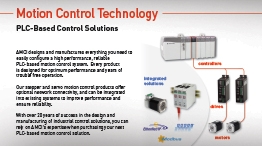
PLC-Based Motion Control Solutions: AMCI designs and manufactures everything you need to easily...
PDF DownloadRMS or Peak Current?
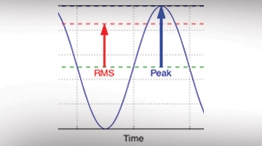
Stepper Motor Drivers specify the amount of Current that they output to a stepper motor in eith...
Read the TutorialSponsored Webinar
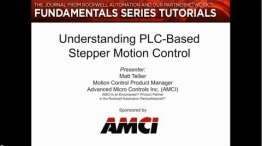
Sponsored by AB Journal - Understanding PLC-Based Stepper Motion Control: Learn about how...
Watch Now

